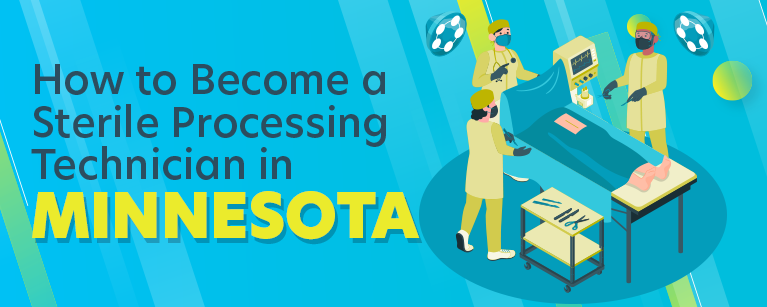
Are you ready to play a crucial part in keeping patients safe?
Sterile processing technicians are the heroes who help make sure surgeries and other medical procedures run smoothly.
As an SPT, you’ll be responsible for carefully cleaning, disinfecting, packaging, sterilizing, and storing all the important tools and equipment doctors and nurses rely on.
If the idea of working behind the scenes in a fast-paced medical environment sounds appealing, you may have what it takes to succeed as a sterile processor.
Not only do you get to support lifesaving work, but it’s a stable career path with opportunities across Minnesota.
In this article, I will explain everything you need to know to get started on a career as a sterile processing technician.
Table of Contents
How to Become a Sterile Processing Technician, Step-by-Step
To become a Sterile Processing Technician (SPT) in Minnesota, the typical education requirements are:
- High school diploma, or GED. Most SPT programs require a high school diploma or equivalent.
- Complete a postsecondary certificate program. Coursework covers topics like medical terminology, microbiology, OSHA and safety standards, aseptic technique, disinfection procedures, quality control processes, and more. Hands-on lab classes teach the proper handling of surgical tools and equipment. Clinical externships provide real-world experience in hospital central service departments.
- In addition to the core education and training, aspiring SPTs in Minnesota should possess:
- Excellent organizational skills and attention to detail.
- Strong communication skills for working with diverse teams.
- Physical ability to stand for long periods and handle heavy equipment.
- Comfortable working in fast-paced environments and meeting deadlines.
- Pass a national certification exam. In Minnesota, SPTs are required to obtain the Certified Registered Central Service Technician (CRCST) certification from the International Association of Healthcare Central Service Materiel Management (IAHCSMM). Passing this national exam demonstrates minimum competency.
Some facilities may accept on-the-job training.
If a formal education program is not completed, SPT candidates can go through extensive on-site training and may be able to sit for the CRCST exam after gaining work experience.
However, most healthcare facilities in Minnesota prefer candidates who have a postsecondary certificate in sterile processing or similar fields.
Certification and Licensing Requirements
While there are no state-mandated education requirements to work as an SPT in Minnesota, most employers prefer candidates who have completed a formal training program.
Plus, getting certified helps your chances of finding a great job.
Two main associations offering certification exams for entry-level sterile processing technicians in Minnesota are the Certification Board of Sterile Processing and Distribution (CBSPD) and the International Association of Healthcare Central Service Materiel Management (IAHCSMM).
Their tests prove to employers that you have the basic skills and knowledge required for the job.
Luckily, many of the technical school programs help you study for these exams.
So you’ll be ready to pass when it’s time for certification.
If your program doesn’t offer test prep, you can also use study guides on your own.
The exams cost around $125–$175 each.
Plus, you need to retake the exams every five years and keep learning new things through continuing education classes.
Hospitals prefer to hire sterile processing techs who have their certification.
You may even get offered a higher starting salary if you are certified!
Certification shows employers you’re serious about the career.
Sterile Processing Technician Schools in Minnesota
Are you ready for some in-depth SPT certification courses?
Minneapolis Community & Technical College
Offers a Central Services Technician program with financial aid available to qualifying students.
The one-year program blends classroom instruction with hands-on lab work to prepare students for work in healthcare facilities.
Additionally, students gain real-world experience through clinical rotations at local hospitals and clinics.
This practical, well-rounded course ensures graduates are ready to take on the responsibilities of the role immediately upon completing the program.
Upon graduation, students become qualified to take the national certification exam.
Earning this credential opens the door to more career opportunities and can satisfy requirements for employment at many medical centers.
Anoka Technical College
Offers an Associate’s Degree 28-credit program for $237 per credit.
Although more expensive initially, the 2-year degree opens more advanced opportunities for promotion and management down the road.
Financial aid can also help make this affordable.
Plus, there are part-time options for this course.
Saint Paul’s College
The Sterile Processing 30-credit program at Saint Paul College prepares students for a career processing medical instruments and supplies needed for invasive procedures.
Students learn to clean, inspect, package, and sterilize instruments so they are safely used in surgical and other medical settings.
The program takes approximately 1 to 2 semesters to complete and results in a sterile processing certificate.
Students learn in classrooms as well as in the college’s hands-on lab, which mimics a hospital’s sterile processing department.
Graduates are eligible to take the Certified Registered Central Service Technician (CRCST) exam after 400 hours of professional employment.
The cost of the program is reasonable, with tuition estimated at around $5,000.
No matter your budget, these certified programs set you up for long-term success as a sterile processing tech.
What are you waiting for? Jumpstart your new career today!
| School Name | Address |
|---|---|
| Minneapolis Community & Technical College | 1501 Hennepin Ave, Minneapolis, MN 55403, United States |
| Anoka Technical College | 1355 US-10, Anoka, MN 55303, United States |
| Saint Paul's College | 115 College Dr, Lawrenceville, VA 23868, United States |
Job Outlook and Salary
According to the Bureau of Labor Statistics, employment of SPTs is projected to grow 13% through 2030, much faster than average.
This is partly due to the increasing complexity of medical instruments and stricter regulations around infection control in healthcare settings.
Demand remains high in Minnesota as the population ages and requires more medical care.
Starting salaries for certified SPTs in Minnesota are around $34,500, depending on location and employer.
Qualified SPTs with over five years of experience can earn $53,000 a year.
Larger metropolitan medical centers tend to offer the highest pay.
Job security remains excellent in this in-demand field.
Annual Salary Range:| Location | Avg. Annual Salary |
|---|---|
| Minneapolis | $48,286 |
| St. Paul | $48,286 |
| Duluth | $43,396 |
| Rochester | $45,435 |
| Eden Prairie | $48,204 |
| Minnetonka | $48,286 |
| Lakeville | $47,987 |
| Edgerton | $40,006 |
| Foreston | $43,060 |
| Glenville | $45,027 |
Regional Salary in Minnesota
| Region | Employed | Avg. Annual Salary | Avg. Hourly Pay | Top 10% Annual Salary | Bottom 10% Annual Salary |
|---|---|---|---|---|---|
| Duluth, MN-WI | 70 | $42,740 | $20.55 | $51,640 | $35,150 |
| Minneapolis-St. Paul-Bloomington, MN-WI | 830 | $45,560 | $21.9 | $53,780 | $36,170 |
| Rochester, MN | 110 | $48,690 | $23.41 | $65,160 | $36,550 |
* Employment conditions in your area may vary.
Frequently Asked Questions
What training or education is required to become an SPT in Minnesota?
Most facilities require SPTs to complete a certificate program from an accredited college and pass a national certification exam.
What certification is required in Minnesota?
The Certified Registered Central Service Technician (CRCST) certification from the International Association of Healthcare Central Service Materiel Management (IAHCSMM) is the primary certification required for entry-level SPT jobs in Minnesota.
Where can I find job openings in Minnesota?
Popular job sites for SPT positions include linkedin.com, indeed.com, and healthcare.minnstate.edu.
Jobs for SPTs are based in hospitals, outpatient surgery centers, and medical manufacturing and distribution companies.
Sterile Processing Technician Info by State
- Alabama
- Alaska
- Arizona
- Arkansas
- California
- Colorado
- Connecticut
- Delaware
- Florida
- Georgia
- Hawaii
- Idaho
- Illinois
- Indiana
- Iowa
- Kansas
- Kentucky
- Louisiana
- Maine
- Maryland
- Massachusetts
- Michigan
- Minnesota
- Mississippi
- Missouri
- Montana
- Nebraska
- Nevada
- New Hampshire
- New Jersey
- New Mexico
- New York
- North Carolina
- North Dakota
- Ohio
- Oklahoma
- Oregon
- Pennsylvania
- Rhode Island
- South Carolina
- South Dakota
- Tennessee
- Texas
- Utah
- Vermont
- Virginia
- Washington
- West Virginia
- Wisconsin
- Wyoming









